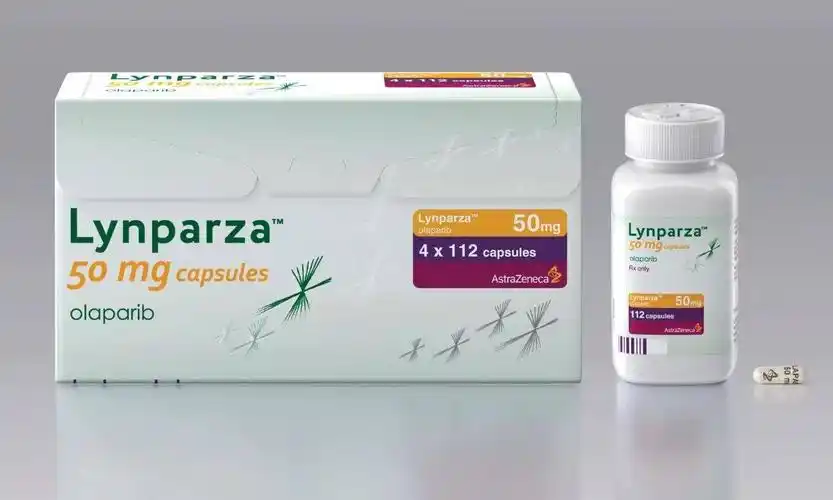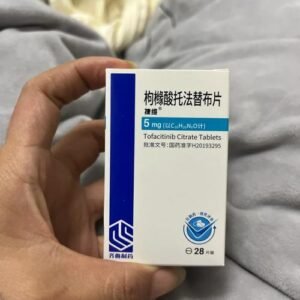LYNPARZA OLAPARIB 奥拉帕尼胶囊 利普卓
Olaparib is an oral targeted drug that belongs to the category of PARP (poly ADP-ribose polymerase) inhibitors, mainly used to treat cancers associated with specific gene mutations. Its core function is to block the ability of cancer cells to repair DNA damage, thereby inhibiting tumor growth. The following is key information about the drug:
I. Indications
The clinical application of Olaparib must strictly follow the doctor’s instructions, and is mainly applicable to:
Ovarian cancer, fallopian tube cancer or primary peritoneal cancer: used for maintenance treatment (i.e., to prevent recurrence after chemotherapy) or advanced treatment of patients with BRCA gene mutations (need to be confirmed by testing).
Breast cancer: for patients with metastatic breast cancer with HER2-negative and BRCA mutations.
Prostate cancer: used for metastatic castration-resistant prostate cancer with HRR gene mutations (such as homologous recombination repair defects).
Pancreatic cancer: maintenance treatment of patients with advanced pancreatic cancer with BRCA mutations.
II. Mechanism of action
Olaparib works by inhibiting PARP enzyme activity. In normal cells, PARP helps repair DNA damage; but in cancer cells with gene mutations such as BRCA, after PARP is inhibited, cancer cells cannot repair DNA double-strand breaks, resulting in a “synthetic lethality” effect (i.e. cancer cells die, while normal cells survive because they have other repair pathways).
III. Usage and Dosage
Standard dose: Usually 2 times a day, 300 mg each time (2 150 mg tablets), can be taken on an empty stomach or with meals.
Adjusting the dose: If serious side effects (such as hematological toxicity) occur, the doctor may reduce the dose to 250 mg or 200 mg/time.
Precautions:
The whole tablet should be swallowed, and it should not be crushed or chewed.
If a dose is missed, it can be taken if it is more than 1 hour before the next dose, otherwise it can be skipped.
IV. Common adverse reactions
Olaparib may cause the following side effects (incidence ≥ 10%):
Hematological system: anemia, neutropenia, thrombocytopenia (regular blood routine monitoring is required).
Digestive system: nausea, vomiting, diarrhea, decreased appetite (can be relieved by taking with meals).
Systemic symptoms: fatigue, headache.
Others: joint pain, abnormal taste.
Serious but rare adverse reactions include myelodysplastic syndrome (MDS), acute myeloid leukemia (AML) and pneumonia, which require immediate medical attention.
V. Contraindications and precautions Contraindications:
People who are allergic to olaparib or excipients.
Pregnant women or those planning pregnancy (may cause fetal malformations).
People to use with caution:
People with bone marrow dysfunction or liver and kidney dysfunction.
Patients who are using strong CYP3A inhibitors (such as ketoconazole) or inducers (such as rifampicin) (may need to adjust the dose).
Special tips:
Effective contraceptive measures should be taken during treatment and for at least 6 months after discontinuation of medication.
Lactating women need to stop medication or stop breastfeeding.
VI. Drug Interactions
CYP3A inhibitors (such as clarithromycin): may increase the blood concentration of olaparib, and should be used with caution.
Anticoagulants (such as warfarin): may increase the risk of bleeding, and coagulation function needs to be monitored.
Other anticancer drugs: combined use may aggravate bone marrow suppression.
VII. Storage and expiration date
Storage conditions: Protect from light, store below 30°C, and avoid moisture.
Expiration date: Based on the original packaging label, it must be used within the period marked on the bottle after opening.
Important reminder: Olaparib must be used under the guidance of an oncologist. Genetic testing must be performed before treatment to confirm the indication, and blood routine, liver and kidney function and other indicators must be checked regularly. Any medication adjustment must follow the doctor’s advice, and the medication cannot be stopped or the dose changed on your own.
View more
Share:
Products
Our offers
Health Classification
Let us work together to protect precious health




























